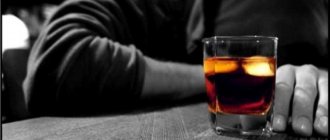( from the editor : given the sensitivity of the topic, we decline responsibility for the conclusions made in the article, and also warn that the opinion of the author of the article may not coincide with the opinion of the editors)
“Here are your keys,” the secretary muttered as I went to get my keys at the university office where I was preparing to defend my thesis in theology. - “It seems you got the Old Brewery.”
The title intrigued me. Later I realized that it comes from the old purpose of this building. Aberdeen was founded in the 15th century and was used to train monks for ministry. At the brewery, the monks produced significant quantities of Scottish ale, which they themselves then consumed in liters during meals. And here I am, a post-fundamentalist professor, a student of Scripture, in a malt monastery where in the Middle Ages Bible college students clapped their glasses in unison in glorifying God.
Throughout Christian history, alcohol was rarely banned as it is in certain circles today. John Calvin received 900 liters of wine annually under a church contract. Martin Luther's wife was a famous beer manufacturer, which undoubtedly softened the heart of the loving reformer. The Guinness family created their beer as a tribute to Jesus Christ. From Bordeaux to Berlin, wine and beer have always been part of the church tradition. But what was once considered the nectar of heaven was later somehow condemned as the devil's drink.
Smart approach
Although some Christians preach complete abstinence from alcohol for all believers, the Bible does not call for followers of Christ to abstain from intoxicating drinks. The Bible condemns drunkenness and drunken slavery (Ephesians 5:18, Titus 2:3), but never claims that drinking tea is a more godly activity. In fact, the Bible does not say that the best way to avoid drunkenness is to never touch alcohol. Think about it. Alcoholism has been a human problem throughout history, but the Bible does not force people to give up alcohol altogether.
If Christians, in order to combat drunkenness, want to prohibit all consumption of alcohol, then, being consistent, they should also give up making money in order to avoid the influence of materialism and the power of mammon.
To drink or not to drink?
Modern Orthodox Christians know that the Church does not object to moderate consumption of wine. There are a lot of statements by the holy fathers of the Church of Christ that it is not wine that is to blame, but its excessive consumption.
For example: “It is not wine that is bad, but immoderation is vicious; wine is a gift from God, and immoderation is an invention of the devil.” (St. John Chrysostom).
But they notice much less other statements of the holy fathers when they write that it is better not to drink than to drink, even in moderation.
Whether a person drinks or doesn’t drink is not the main thing. Everyone has a different attitude towards drinking alcohol:
- I drank, I drink, and I will drink. Even if the whole world goes down, just so I can drink vodka. - But wine is allowed in the Church! I'll go grab some vodka. - Yes, I just had a glass of wine and that’s it. And the rest, who don’t know how, shouldn’t drink. I have nothing to do with this, “I’m sitting, not bothering anyone, fixing the Primus.” (c) Thank you, Lord, that I am not like this drunkard. And in general, Lord, am I my brother’s keeper? - Lord have mercy! I'm weak, I can't live without drinking.
Who will come more justified?
There is a service going on in the church, a drunken man comes up to me and can barely stand on his feet. He asks where Nikolai Ugodnik is. I showed it. The man approached the icon and stood up. It feels like he doesn’t even see the icon. He stood there, sighed heavily, and swayed out of the temple.
It seems to me that the greater sin is not that a person drinks, but that he considers himself to be right. And there are arguments in favor of being right. For example, only the lazy will not remember the marriage in Cana of Galilee, where the Lord turned water into wine. Jesus Christ yielded to the request of the Mother and helped out the owner of the house, who lacked wine. So that the day of joy is not darkened. Nothing is said in the Gospel about the fact that there were drunks at the table. Jews were distinguished by moderation in drinking. This speaks both about the quality of the wine and about people who are not used to getting drunk to the point of robes.
You can also say about the miracle at Cana as a symbol. In the Old Testament, wine was a symbol of earthly joy - “wine gladdens the heart of man.” (Ps. 103:15). In the New Testament, wine becomes a symbol of spiritual joy. Jesus Christ turned wine into His Blood. During the sacrament of wedding in church, the newlyweds drink a little wine. The unity of husband and wife is blessed. Everything has a meaning.
One can imagine what would happen if in our time there was not enough wine at a wedding. It will turn out something like in the film “Autumn Marathon”: “Yesterday, after mushrooms, we had lunch - it wasn’t enough! There wasn't enough to go to the grocery store! We went again - and there were these... vigilantes.”
Let's be honest, I want to drink - yes, please, no one forbids it. So what's up? But this desire is framed as if Christ himself commanded to drink. The Scriptures and the Holy Fathers speak only about wine. Indeed, wine is a gift from God. What about other alcohol, for example, vodka, moonshine, or the Jaguar alcoholic cocktail? Is this also all a gift from God? We say that Jesus Christ drank wine, but we mean that moderate drinkers can also consume alcohol without advertising its name. Cunning, and that’s all.
The Apostle Paul wrote to Timothy: “From now on, drink more than just water, but use a little wine for the sake of your stomach and your frequent illnesses.” (1 Tim. 5:23). And since the apostle said, we must do it, today we are all Timothys. And we do it. True, we don’t drink wine, but everything in a row, not just a little, but as much as we want, but we don’t even remember about our stomach. But the Apostle Paul wrote a lot more. About asceticism, about responsibility: “It is better not to eat meat, not to drink wine, and not to do anything that causes your brother to stumble, or to be offended, or to faint.” (Rom. 14:21). But we choose what we like. The apostle suggests to those who are strong in faith not to eat meat and not to drink wine. So as not to tempt your weak brother.
Blessed Theophylact of Bulgaria interprets this passage this way: “You, he says, force your brother to eat what he does not dare to eat, but I say that you should abstain from everything that tempts your brother, not because it is evil (for everything is pure) , but because it's tempting. By the word he stumbles, he shows that he is blinded; for the blind stumble. And he is tempted as a frivolous one, and faints as one of little faith. All this attracts the strongest to help his brother, as if he were completely weak.”
Saint Tikhon of Zadonsk writes: “A drunken person is capable of all kinds of evil, he goes to all sorts of temptations. The one who treated him like this becomes a participant in all his iniquities, since a sober person would not accept such temptations.”
Many of us can remember times in our lives when we seduced another person while drinking alcohol. Our colleague didn’t come to work this morning because he couldn’t stop after yesterday’s evening together. Which of us can honestly say that he had nothing to do with it? The sin is not that we drank wine, but that we seduced our brother. By harming another, we automatically harm ourselves. Where is the line that we crossed and seduced another?
The Apostle Paul said that the Church is the Body of Christ. Whether we like it or not, we extend ourselves to others, both in a good and a bad sense.
Of course, you can seduce your weak brother with more than just wine. Almost everything that our life consists of can be summed up under these words “and not do anything like that.” But there are two big differences, as they say in Odessa.
After drinking wine, a person is in an altered state, in which it is easier for him to be tempted. As St. Basil the Great writes: “Wine leads itself to more; it does not satisfy the need, but makes the need for another drink inevitable, inflaming those who are drunk and constantly arousing them to greater thirst. But when they think that their desire to drink is insatiable, then they experience the opposite of what they wanted.”
None of the holy fathers prohibits drinking wine, but everyone recommends that it is better not to drink than to drink. But there is even a direct prohibition, in a specific situation for specific people. For example: “It is forbidden to drink strong wine and other intoxicating drinks that cause drunkenness. And if anyone drinks, although he is not drunk, but is noticed to have been drinking, he will be fined.” (Saint Tikhon of Zadonsk). This ban is not for everyone, but for seminarians, but still a ban. Saint Tikhon took a responsible approach to the education of seminarians.
There was a time when we met to celebrate someone's Angel Day. There were no alcoholic drinks on the table at all, because one of us was abusing alcohol. 20 people gave up alcohol for a while for the sake of one of their friends. That's what our confessor told us. Everything is clear here. But there are often situations when we do not know about the alcohol addiction of the people around us. What should an Orthodox person, and especially a churchgoer, do in such cases? Everyone decides for themselves, to the best of their understanding, to the best of their understanding of responsibility to others. We are not to blame for drinking wine, but are we not to blame when our personal example of alcohol consumption seduces another?
More about responsibility for those who can be seduced or who have already been seduced: “I saw one person who passed on his sinful habit to another; then, having come to his senses, he began to repent and abandoned sin; but since the one taught by him did not stop sinning, there really was no repentance.” (Saint John Climacus).
“Don't get drunk. But how to set the measure at which drunkenness begins? It’s best for Christians - don’t drink at all, except in extremes, in forms of healing. Of course, it is not wine that is reproachful, but drunkenness; but fire is added to the blood by a small amount of wine, and the resulting carnal joy scatters thoughts and shakes moral strength. What need is there to plunge oneself into such a dangerous situation? Especially when it is realized that every minute of time needs to be redeemed, and with this act not minutes, but days are given away for free to enemies, and goodness would be for free, otherwise with an additional payment? “So, judging strictly, wine drinking should be completely banished from use among Christians.” (Theophan the Recluse. Interpretation of Ephesians 5:18).
Judging strictly, wine drinking should be banished. And if it’s not strict, then we can allow you to drink, given human weakness? But then you will have to admit your weakness, unwillingness or inability to at least some kind of limitation. If we cannot do this, then it is enough not to be irritated by the manifestation of sobriety in others, and if possible, not to show your wine drinking to others. This alone will be a feat. If we can’t do this, then at least not out loud not to show our irritation, not to call people who live soberly sober people and former drunks. After all, if a cultural drinker is irritated by even the mention of a sober lifestyle, this means that he himself is already dependent either on wine or on the opinions of people who drink. If we cannot do this, then at least later, alone with ourselves, think about the words of Theophan the Recluse.
“Reinforce yourself in advance with spiritual nourishment, performing soberly and cheerfully the statutory services and sacred prayers, and then, due to the difficulty of the work, with bodily nourishment - bread, boiled vegetables and wine in the prescribed amount. This is for those who are not very healthy. Whoever has the desire to abstain, thanks be to the Lord! - let him abstain. But let no one who drinks be embarrassed as if he were falling; Let no one who does not drink become arrogant, as if he were doing something great: for he will not make us worthless before God (1 Cor. 8:8), especially if at the same time we become vain. What is not suitable for young people is drinking wine. Who will contradict? But it is also good for everyone not to drink wine, especially for those who are strong in body. However, I deliberately allow some people to drink wine, according to the rules, to humble their thoughts - not forever, but for a while.” (Reverend Theodore the Studite).
I was 16 years old when a distant relative of mine, a heavy drinker, suddenly stopped drinking completely. And he spoke with such contempt and condemnation about the drunks whom we then saw that I remembered it very much. Later, he finally lost his temper, got completely drunk and died. It is very difficult for a person who leads a sober lifestyle, but is far from the Church, to refrain from judging people who drink. “Whoever judges and condemns will do the same thing later.” (Reverend Ambrose of Optina).
The Monk Theodore the Studite even writes this in his 91st homily: “He who abstains from wine carries the Holy Spirit within himself. He who drinks water puts on the garment of tenderness.”
This does not mean at all that Orthodox Christians who do not drink wine carry the Holy Spirit within themselves. But other things being equal, they still have a greater chance of achieving such a dispensation that the Holy Spirit will be with them. For it is impossible to be “filled with spirit and wine at the same time.” Saint Ignatius Brianchaninov quotes the words of St. Isaiah, an Egyptian hermit, that “those who love wine will never be granted spiritual gifts: these gifts, in order to remain in a person, require constant purity, possible only with constant sobriety.”
This article is addressed to those who want to be honest with themselves. And who, if not an Orthodox Christian, strives for this? If he is honest with himself, then he will not lie before God.
Alcohol as evidence
Sometimes I hear the opinion that Christians who drink are destroying the power of their testimony for Christ. To be honest, I don’t understand from what conclusions this conclusion follows. It's one thing if you are a witness to an alcoholic or minister in the Muslim world, but in most cases the non-believers I know personally lose interest in matters of faith when they hear our categorical "dos and don'ts" invented by modern believers. I can hardly be convinced that if my unbelieving neighbor sees me with a bottle of beer, he will never want to hear the Good News from my lips. In most cases, the Gospel is more readily accepted when we break the fabricated stereotypes about Christianity and invite our neighbor to share a bottle of cold beer with us.
When we let go of the man-made veils that hide the light of God's gospel, the full glory of Christ shines that much brighter. In many cases, what the lost world rejects is not Christ at all, but a paraphrase retold by His careless representatives. Some did not want to listen to the Gospel because they were convinced that following Christ was incompatible with a bottle of beer with co-workers on Fridays after work. If this is our “good news,” the real beauty of the gospel message is clouded by our man-made “never drink.” It was not the director of Alcoholics Anonymous who was crucified on the cross, and it is not abstinence from alcohol that gives us eternal life. Any man-made, unbiblical addition to the gospel actually interferes with and insults the true gospel.
How does the Church relate to alcohol and wine?
And alcoholic drinks are a very dangerous product!
Over 800 thousand people die from alcoholic beverages in Russia every year!
Some drank too much and drowned, some drank too much alcohol and fell asleep with a cigarette in their hands, and the majority, drinking alcohol regularly, simply kill themselves from the inside.
So should we give up alcohol completely?
Let's find out from Doctor of Medical Sciences, Candidate of Theology, Professor, Priest Sergius Filimonov, how does the Orthodox Church relate to alcohol and wine?
─ The Bible says that “wine gladdens the heart of man” (Ps. 103:15) and “it is beneficial... if you drink it in moderation” (Sir. 31:31).
However, both in the Holy Scriptures and in the works of the holy fathers, we repeatedly find strict condemnation of the vice of drunkenness, which, starting unnoticed, entails many other disastrous sins. Very often, drunkenness becomes the cause of family breakdown, bringing untold suffering both to the victim of this sinful illness and to loved ones, especially children.
“Drunkenness is enmity against God... Drunkenness is a voluntarily summoned demon... Drunkenness drives away the Holy Spirit,” wrote St. Basil the Great. “Drunkenness is the root of all evil... A drunkard is the living dead... Drunkenness in itself can serve instead of any punishment, filling souls with confusion, filling the mind with darkness, making the drunk a prisoner, exposing countless diseases, internal and external... Drunkenness... is a diverse and multi-headed beast... Here fornication grows in him, and so does anger; here is dullness of mind and heart, and there is shameful love... No one fulfills the evil will of the devil like a drunkard,” instructed St. John Chrysostom. “A drunken person is capable of all kinds of evil, goes to all sorts of temptations... Drunkenness makes its adherent incapable of doing anything,” testifies St. Tikhon of Zadonsk.
The main reason for the flight of many of our contemporaries into the realm of alcoholic illusions is spiritual emptiness, loss of the meaning of life, and blurred moral guidelines. Drug addiction and alcoholism become manifestations of spiritual illness not only of an individual, but of the entire society. This is retribution for the ideology of consumerism, for the cult of material prosperity, for lack of spirituality and the loss of true ideals. Treating victims of drunkenness with pastoral compassion, the Church offers them spiritual support in overcoming vice. Without denying the need for medical care in the acute stages of drug addiction, the Church pays special attention to prevention and rehabilitation, which are most effective when the sufferers are consciously involved in Eucharistic and community life. (From the materials of the Council of Bishops of the Russian Orthodox Church, 2000)
Add to the words about. Sergius can only say that before drinking alcohol, you need to know the size of your maximum dose (two or three glasses), and try never to exceed them. Then there will be joy in the heart, and the mind will not be artificially clouded and “turned off.”
Help us, Lord, and grant us strength and wisdom to always be on the right path!
Questions for the priest >>
Not the same wine at all?
Some say that in biblical times, alcohol was no stronger than grape juice, so neither Jesus nor the writers of the Bible could have advocated the use of alcohol. Others say that the wine was diluted so much that it contained virtually no alcohol at all. But there is no evidence to support any of these theories in Scripture. If wine was just juice, why then did Paul encourage the Ephesians not to get drunk on grape juice, but to be filled with the Holy Spirit? Something doesn't add up here. Perhaps wine was really not as strong then as many drinks today. But no matter what its strength, people then managed to get drunk in the trash (Proverbs 20:1, Isaiah 5:11). Yet the Bible does not tell us not to drink at all.
There is another drink that is mentioned in the Bible as “strong drink” - strong drink. The Hebrew word from which the name comes translates as fermented malt. That is why in some translations “siquera” is translated as “beer”. The strength of the sicker was around 6-12 percent, like some Belgian strong beers. As with all alcoholic beverages, the Bible forbids drinking beer (Isaiah 5:11, 28:7, Proverbs 20:1, 31:4). But drinking beer in moderation is even recommended (Proverbs 31:6). And if we're being completely honest, in Deuteronomy 14:26 God commands the Israelites to spend part of their tithes on buying beer to celebrate with the Lord. Ever heard this verse read during a church fundraiser? They were also commanded to bring up to two liters of beer to God six days a week, and even more on Saturday (see Numbers 28:7-10). That is why the lack of wine and beer was a manifestation of God’s judgment on the people.
What does the Bible say about alcohol?
Photo: Pixabay.com
There are many references to alcohol in the Bible. It contains even more warnings against alcohol abuse.
“Do not get drunk with wine, which will cause you to indulge in revelry.” Ephesians 5:18
The dangers of excessive drinking are also mentioned in Proverbs 23:20.
“Be not among those who are drunk with wine, nor among those who are full of meat; for the drunkard and the one who is full will become poor.”
The words from Isaiah 5:11 can also be called a warning.
“Woe to those who from early morning look for strong drink and until late in the evening heat themselves up with wine.”
In a word, drunkenness is not encouraged by Orthodoxy. However, you can find references in the Bible to the benefits of wine, albeit with very moderate consumption. This is what the Psalms say about wine, which makes a person happy. Remembering the healing properties of wine, in his letters to Timothy the Apostle Paul recommended:
“Drink no more water, but use a little wine for the sake of your stomach and frequent ailments” (1 Timothy 5:23).
As we see, the Bible does not prohibit drinking wine. However, it condemns alcohol abuse and drunkenness. Moreover, the Bible clearly states:
“Drunkards will not inherit the kingdom of God” (1 Corinthians 6:9, 10).
In Orthodoxy, the sin of drunkenness is on a par with such a sin as gluttony, and the Bible itself says that both one and the other should be avoided.
Publications
About this theme:
- Unscientific about the pandemic
- Poems by Tatyana Feofanova: about church service, about family, about love
- Parable of Anger
- READING FOR EVERY DAY: Answers of the Holy Fathers of the Church to the questions of the laity. Part 2 (questions 16-30)
- READING FOR EVERY DAY: Answers of the Holy Fathers of the Church to the questions of the laity. Part 1 (questions 1-15)
- READING FOR EVERY DAY: Ancient Patericon. Chapter 1. The exhortation of the holy fathers to prosperity in perfection. Part 2
Keywords: Health Christian life
What does Christian teaching say about alcohol? Is it better to drink “in moderation” or abstain from alcohol? What does it mean to drink “in moderation”? Who and what alcoholic drinks are allowed to drink? How does alcohol affect the soul? About this and much more in the article by Alexander Savelyev.
We often hear that one should drink civilly, “in moderation.” However, few people think about what Christian drinking culture is like. Modern “moderate” (and from the point of view of Christianity - immoderate) drinkers, based on quotes taken out of context, and often words invented by them themselves, form their own “creed”, justifying the use of undiluted wine not only by adult men, but even by women and youth .
Many people cite an expression supposedly from the Bible: “Drink, but do not get drunk.” However, Scripture says: “Do not get drunk” and there is no call at all: “Drink.”
Also in the New Testament it is written:
“It is better... not to drink wine or do anything that causes your brother to stumble or be offended...” (Rom. 14:21)
In order to better understand this issue, let's see what Church Tradition says about alcohol.
Women are not allowed to drink alcohol.
“And the wife would absolutely never have intoxicated drink in any way: no wine, no honey, no beer, no treats. And the wife would drink alcohol-free mash and kvass, both at home and in public.” (Domostroy)
Also, the holy fathers do not allow young people to drink alcohol.
“Fear wine at all times, young one; because wine never spares the body, kindling in it the fire of evil desires.” (Reverend Ephraim the Syrian)
Clergy should abstain from alcohol and set an example of sobriety to others. Also clergy and clergy members.
Saint John Chrysostom: “If those who entered the sanctuary did not touch the wine at all, then even more so they (the deacons) should not have done this.”
Council of the Russian Orthodox Church 2009: “Priests, by virtue of their sacred duty to be a model for a good life, must abstain from drinking alcoholic beverages... Teachers and singers, honored by standing in front of the people in the church, must also go ahead along the path of leading a sober life.”
It is unacceptable to drink wine at a funeral.
“If you commemorate the deceased by drinking wine and make those who are called to drink drunk, you are not interceding for deliverance from torment for the soul of the deceased, but you are bringing the fire of hell to him.” (St. John Chrysostom)
Adult men are allowed to occasionally drink a little wine diluted with plenty of water, but it is better not to drink it at all.
Saint John Chrysostom writes: “Wine is not bad, but immoderation is vicious.” What was considered immoderation in the time of Chrysostom?
This is what V.V. Pokhlebkin writes in the book “The History of Vodka”: “The ancient Greeks and Romans diluted wine as follows: take one part of wine to three parts of water, or two parts of wine to five parts of water. A mixture consisting of grape wine half and half with water (i.e., equal volumes of water and wine) was considered too strong and was used only by degenerate people who were considered inveterate drunkards.”
Thus, John Chrysostom does not prohibit drinking natural wine diluted with water in a ratio of 1:3, but in very small quantities so that it does not weaken the strength of the soul.
What kind of moderation can we talk about when, instead of drinking natural wine diluted with plenty of water, we drink store-bought poison - the so-called “wine”, to which manufacturers specifically add ethyl alcohol (such wines are called fortified, among them Cahors is included, for example), so that the mixture is stronger, and we drink this potion undiluted? There is no need to talk about vodka, cognac and other strong drinks like them - everyone understands that it is unacceptable for a Christian to be poisoned by these drugs.
Euthymius Zigaben, in his interpretation of Psalm 103, cites the words of St. Cyril of Alexandria, who recommends “mixing wine with plenty of water. For, being hot and containing pleasant juices, when dissolved in the proper quantity, with its warmth it dissolves vile excesses, and dissolves pungent and bad juices with its fragrant ones.”
From these words we can conclude that in those days it was not ethanol and its intoxicating properties that were valued in wine, but the properties of grape juice, but ethyl alcohol, called St. Kirill sharp and thin juices, was a preservative, the amount of which was significantly reduced when diluting the wine with a large amount of water.
All the holy fathers are unanimous that it is better not to drink even wine diluted with a large amount of water, and some strongly call for giving up alcohol.
“As you enjoy yourself with wine, you will spend your life in cohabitation with shameful thoughts, and you will experience many sorrows.” (St. Theodore of Edessa)
“It is good for everyone not to drink wine, especially for those who are strong in body.” (St. Theodore the Studite)
St. Gregory the Theologian: “Wine is the ignition of a cooled passion; and every substance added to the fire strengthens the flame.” “Wine, by its nature, is not acquainted with chastity; it produces pleasure because it irritates.”
“Whoever abstains from wine with wise moderation, the vineyards of paradise await him especially, and each vine extends its clusters towards him.” (Reverend Ephraim the Syrian)
Saint John Chrysostom very accurately Fr.
Modern science confirms Chrysostom’s opinion. V. M. Bekhterev wrote: “It has been proven that even small doses of alcohol weaken mental abilities.” “Autopsies of moderate drinkers have shown that their brains contain entire cemeteries of dead cortical cells. Changes in brain structure occur after several years of drinking alcohol. When examining 20 such people, all of them were found to have a decrease in brain volume or, as they say, a shriveled brain. “All of them showed clear signs of brain atrophy, changes in the cerebral cortex, i.e., where mental activity occurs, the memory function occurs.” (F. G. Uglov)
“Wine renews all passions and drives out the fear of God from the soul.” (Venerable Abba Isaiah)
“The fire contained in the wine, having passed into the body, becomes an inflammatory substance for the enemy’s kindled arrows; because wine drowns reason and intellect, and ignites lust and voluptuousness, like oil ignites fire.” (St. Basil the Great)
“He who abstains from wine will see himself not carried away by thoughts, not on fire spiritually, but always sober in the love of God and zealous for everything that is better and promotes salvation.
He who abstains from wine carries the Holy Spirit within himself. He who drinks water puts on the garment of tenderness...” (Reverend Theodore the Studite)
“Likewise, the Most Pure Mother of God appeared to the great Saint Basil of Caesarea in a dream, saying: “If you want to be my friend and have me as an assistant in everything, then refuse wine and drunken drinking.” He began to marvel at the commandments of the Most Pure Mother of God and until the end of his life he kept the commandment of the Most Pure Mother of God without drinking wine.” (Stoglav, chapter 52)
Myth one. Advice of the Apostle Paul
Many say: “The Apostle Paul advised Timothy: “From now on, drink more than just water, but drink a little wine, for the sake of your stomach and your frequent illnesses” - I’ll go and drink a little wine.”
Firstly, the Apostle Paul advised Timothy to drink wine as a cure for some stomach disease and for the sake of frequent illnesses, and not for fun. Secondly, the healing properties of wine do not lie at all in the properties of ethanol, which has a destructive effect on the stomach, but in the properties of grapes. Mixing with gastric juice, grape acids improve digestion and appetite. Grape juice is also rich in tannins, which prevent the occurrence of inflammatory processes in the gastrointestinal tract. We find confirmation of this in historical evidence that speaks of the use of unfermented non-alcoholic wine for medicinal purposes in the ancient world. The ancient scientist Athanasius (Athenaeus) in his treatise “The Dinner Party” writes: “Let him drink sweet wine, diluted with water, or warmed up, for this is good for the stomach, since sweet wine does not intoxicate.” Here we see advice that is similar to the advice of the Apostle Paul. This is what Nomocanon answers to people who, referring to the words of the Apostle Paul, say that it is good to drink wine in moderation: “First fast fast and drink water for many years and show the rest of the works of Timothy. Mortify this body and then drink wine in moderation.”
Saint John Chrysostom says about the Apostle Timothy: “this saint, even obsessed with illness and frequent ailments, did not drink wine until his teacher commanded him.”
Blessed Theophylact of Bulgaria Fr.
Let us also, imitating Timothy, abstain from wine. If our stomach hurts, we can treat ourselves with fresh grape juice, which has the beneficial properties of wine, but does not contain ethanol, which is harmful to the stomach. Fortunately, grapes are sold in stores at any time of the year, and juicers can be purchased at affordable prices.
How unreasonable are those who drink vodka, which does not contain healthy grape juice, but only a preservative - ethyl alcohol, which causes harm to the soul, body, and stomach! The Apostle Paul would probably have said to them: “Do not drink vodka, because it harms the stomach.”
Myth two. That the statutes permit wine “by the cup”
Many people justify drinking undiluted wine by citing statutes that allow one cup of wine per person. They imagine that the volume of these cups is approximately equal to the volume of the cups for the Eucharist, and that the rules allow drinking undiluted wine.
Firstly, the wine was diluted with a large amount of water, this was a widespread custom. Secondly, the same statutes say that it is better not to drink wine at all. Thirdly, the size of the cups was certainly not the same as that of the vessels for the Eucharist. At the liturgy, everyone receives communion from the same cup, it is common, and therefore large. Everyone understands that individual bowls are much smaller than common ones. It can be assumed that individual bowls were comparable in volume to shot glasses. Fourthly, the same charter says that it is allowed to drink wine only on Sundays and holy days, but on other days it is unacceptable. Fifthly, the Council of the Hundred Heads ordered not to pay attention to the permission to drink wine “by the cup”. “And the Holy Fathers command to drink one cup at a time, or two, or three, whatever we want to hear” (Stoglav, chapter 52). Thus, even if it is written somewhere in the statutes about wine, it has no force for us, since the Stoglavy Council revoked this permission.
For what reason did the Stoglavy Council revoke the permission to drink “by the cup”, borrowed from the Greek statutes into the ancient Russian ones?
To answer this question, you need to understand that there are significant differences in the ability of representatives of different nations to neutralize alcohol that enters their body. For example, among southern peoples, who have been drinking wine from time immemorial, this ability is higher than among northern peoples. And over the course of many generations, the body has learned to produce special enzymes that neutralize it.
And the peoples of Russia at the genetic level have a very low ability to break down alcohol that enters the body. That is why drinking even small doses of alcohol quickly leads to alcoholism. The Council of the Stoglavy, seeing that drinking wine leads to drunkenness, decided that Greek customs were not suitable for Rus'.
Samuel Maskevich (about 1580-1632) - Polish nobleman, clerk, who visited Russia repeatedly and for a long time, Fr.
Mikhalon Litvin, who visited Russia in the 16th century, wrote: “Truly among the Muscovites, anyone who just tastes wine receives eight to ten blows with sticks and pays a fine in the same number of coins.”
Thus, our ancestors lived in sobriety, and church and state policies were aimed at combating wine drinking.
If among our loved ones there are people who are addicted to wine, we must do everything to help them get rid of this illness, and the most effective remedy against alcohol is a personal example of absolute sobriety and complete abstinence from alcohol.
The Apostle Paul writes: “If food makes my brother stumble, I will never eat meat, lest I cause my brother to stumble.”
You can also say: “If wine causes my brother to stumble, I will never drink wine, lest I cause my brother to stumble.”
Compiled by Alexander Savelyev.
Source: https://hristianam.com/hristianstvo-i-alkogol/
Does the Bible prohibit drinking alcohol? Opinions
In the world, the question of drinking or not drinking, as a rule, does not even arise and there are many reasons for this. But in Christianity it is not so easy to come to a common opinion. Some argue that believers are strictly forbidden to drink, others are more loyal and support drinking alcohol, but in moderation. We tried to figure it out and find the answer to the question: to drink or not to drink. And does the Bible prohibit drinking alcohol?
SUBSCRIBE ↓↓↓
New Christian Music (LOGOS | Music)
Christian quotes and aphorisms on various topics (LOGOS)
The instruction for priests in the book of Leviticus is directly related to Christians
Yuri Sipko, pastor, ex-chairman of the Russian Union of Evangelical Christians-Baptists (Russian Union of ECB):
Scripture defines believers as a priesthood: “You yourselves, like living stones, are built up as a spiritual house, a holy priesthood, to offer up spiritual sacrifices acceptable to God through Jesus Christ” (1 Peter 2:5). “But you are a chosen race, a royal priesthood, a holy nation, a special people, that you may proclaim the praises of Him who called you out of darkness into His marvelous light” (1 Peter 2:9).
In this case , the prescription for priests in the book of Leviticus has a direct bearing on Christians . “You and your sons with you shall not drink wine or strong drink when you enter the tabernacle of meeting or approach the altar, lest you die. This is an everlasting statute throughout your generations” (Lev. 10:9). You can notice from this text and others that the tolerant attitude towards drinking alcohol was caused by some condescension, as if it were a painkiller for people who have lost hope: “Give strong drink to the perishing and wine to the saddened soul: let him drink and forget his poverty and not remember more about your suffering” (Prov. 31:6,7). Compare: “It is not for kings, Lemuel, not for kings to drink wine, nor for princes to drink strong drink, lest, having drunk, they forget the law and pervert the judgment of all those who are oppressed” (Prov. 31:4,5).
To this day, Evangelical Baptist Christians do not drink alcohol.
For treatment prescribed by a doctor, alcohol-containing medications are not prohibited.
Drunkenness is Strictly Condemned by God
Vasily Filat, pastor of the Baptist Church “Good News” in Chisinau, head of the Association “Instruction in the Word”:
Drunkenness is categorically condemned by God. In his letter to the Galatians, the Apostle Paul wrote: “The works of the flesh are known; they are: adultery, fornication, uncleanness, lasciviousness, idolatry, sorcery, enmity, quarrels, envy, anger, strife, disagreements, (temptations), heresies, hatred, murder, drunkenness, disorderly conduct and the like. I warn you beforehand, as I warned you before, that those who do these things will not inherit the kingdom of God” (Galatians 5:19-21).
Drinking wine is one of the topics in the “controversial opinions” category.
In Romans 14, the Apostle Paul addresses the topic of controversial opinions and begins with this: “Accept him who is weak in the faith without arguing about opinions” (Romans 14:1).
What are controversial opinions? There are certain topics or aspects of the Christian life to which God does not place as much importance as some people do. Some people think that these aspects are decisive for our salvation, and therefore attach great importance to them. One thing is clear that a spiritually mature Christian does not rant, does not quarrel, does not put pressure, justifying controversial opinions. Among the things included in the category of these controversial opinions, chapter 14 lists certain types of food, meat, the honoring of certain holidays, and the use of wine. The apostle says that we should not judge or devalue anyone for this reason, but at the same time we should avoid discussing these topics, knowing that this will not bring building, but most likely can produce contempt or a spirit of condemnation. At the end of the chapter, the Apostle writes: “Let us therefore seek what leads to peace and mutual edification. For the sake of food, do not destroy the work of God. Everything is pure, but it is bad for the person who eats because he is tempted. It is better not to eat meat, not to drink wine, and not to do anything that causes your brother to stumble, or to be offended, or to become weak. Do you have faith? have it within yourself, before God. Blessed is he who does not condemn himself in what he chooses. But he who doubts, if he eats, is condemned, because it is not by faith; and whatever is not of faith is sin” (Romans 14:19-23).
The Bible doesn't say anything about "drink, but don't get drunk"
Oleg Podkopaev , pastor of the House of Bread - Western church in Krivoy Rog:
I don't pretend to be universal. I’m just tired of listening to the hackneyed “It’s written in the Bible: drink, but don’t get drunk” and “Well, Jesus also drank wine,” and so I decided to combine everything I think about this into one note.
Let's start with the fact that the Bible does not say anything about “drink, but do not get drunk.” This is a trivial alteration of the eighteenth verse of the fifth chapter of Ephesians.
It says: And do not get drunk with wine, from which comes debauchery; but be filled with the Spirit.
Our folk craftsmen, who really needed such an authoritative source as the Bible to confirm their weakness, decided to slightly change this verse. For yourself and for yourself. By the way, some of those who “quote” this verse also walk - for themselves.
And then there is a very thin line between “drink” and “don’t get drunk.” How much do you need to drink without getting drunk? How much do you need to drink to get drunk for life?
As for “Jesus drank wine”... Of course, we will have to fight here.
So - Jesus drank wine.
To all those who were delighted by this message and who immediately felt better, I say: since you are such ardent followers of Jesus, please note that this only applies to wine. Jesus did not drink absinthe, alcohol, pervach, cognac and armagnac, balms, brandy, whiskey, vodka, grappa, gin, rum, moonshine, tequila, schnapps and even beer(!). If I didn’t add something to the list, and you discovered exactly what I didn’t add and were happy again, I’ll say it again - Jesus drank only wine (and water).
And this is without any deep dives into the fact that in the Bible the word “wine” very often translated any drink made from grapes, even non-alcoholic. And even without quoting passages from the Proverbs of Solomon, where a lot of interesting things are said about wine, including the fact that it is mocking and causes red eyes.
Now. I would like to draw your attention to the fact that Jesus DRINKED wine. That is, this happened sometime in the past. Of course, He did a lot more. And what a pity that lovers of one fact of His life do not repeat everything else after Jesus. For example, loving enemies, blessing those who curse, doing good to those who hate, and praying for those who mistreat and persecute (Matthew 5:44). That would be interesting.
But where am I leading with all this? To the Gospel of Luke 22:18. The following terrible words are written there: “...for I tell you that I will not drink of the fruit of the vine until the kingdom of God comes.”
Jesus speaks these words during the Last Supper. And if you have already decided to follow Jesus in one thing, then you need to develop. We must learn to follow Him in everything. If you have already called yourself a “Christian,” which means “like Christ,” then you need to climb into the Christian basket. Because it may turn out that at some stage you simply cease to be like Christ. And you will begin to become like another, darker figure. About which, by the way, nowhere in the Bible is it said that she drank wine. But, nevertheless, this figure is very well versed in wine and other alcoholic drinks and has destroyed more than one soul with their help. I'm talking about the devil.
Let's return to the words of Jesus Christ. Before His crucifixion, He told His disciples that He would not drink from the fruit of the vine until the Kingdom of God had come.
Therefore, you have two options: either drink wine and understand that this no longer unites you with Jesus Christ, or wait for the coming of the Kingdom of God and already in this Kingdom get drunk with wine with Christ (it will even be possible for brotherhood).
“One stone is a pile? Are there two stones? And three...”
Denis Podorozhny , pastor, religious scholar:
It is not reasonable to deny that in biblical times they drank wine, but, excuse me, the culture of its consumption was completely different from that which was formed in our post-Soviet space.
We didn’t know the limits! And if they knew, then only not a little.
It’s always funny to hear an opposition based on juggling the phrase “don’t get drunk with wine.” They say, “We drink, but we don’t get drunk!” Where is the line? Where is the transition point? Someone is a persistent tin soldier, like our captive fighter in “The Fate of Man,” who stood on his feet even after the second glass of alcohol (“I don’t have a snack after the first”). Another begins to sing after the first drink.
I think there is no point in reminding you of the ancient sophism “One stone is a heap? Are there two stones? And three...” Drinking, drinking and getting drunk are also very subjective concepts. What one calls drinking, another calls “getting drunk until a pig squeals” (sorry about...).
I can't understand people who are careless about a thing called alcohol
John Piper, theologian and founder of Desiring God:
“What do you say to those who say it’s okay to drink because Jesus drank wine?”
I think we should just add a couple of words to this sentence, like “drinking might be okay”... okay? The expression “It's normal” may or may not imply a healthy lifestyle.
I would say that in some cases it is not okay to drink, such as getting drunk to the point of intoxication. The Bible is clear about this. Another instance where it is not okay is to drink with someone who clearly has a wounded conscience and is easily seduced and drawn into addiction so much so that they have already spent six years in Teen Challenge or Alcoholics Anonymous rehab programs to break free. And now you are involving them in the very thing that is killing them! And it's killing millions of people in our culture. It's killing families, killing jobs. Alcohol is deadly in this culture.
I don't know how deadly this was in Jesus' culture. Drinking was a reality. The Bible clearly condemns him. But how real and deadly it was, I don’t know. I only know what I'm dealing with when I go talk to people at Teen Challenge or when I pray for a man like the one I prayed for last Sunday after service and who told me, “When the service is over, I'm out.” and I go get drunk because I’m sick of everything. I think I am an apostate and cannot be helped and cannot be forgiven. And I've been through treatment so many times, and it's hopeless." I just know that it is very common. I can't understand people who are careless about a thing called alcohol.
So I just say, “Add a word to this sentence.”
Archpriest Georgy Gulyaev, rector of the Church of St. Ignatius of Mariupol
7 reasons why you shouldn't drink alcohol
Roman Savochka , a Christian blogger, gave his 7 reasons why he does not drink alcohol:
1. Because my parents never drank. I was raised in a Pentecostal family where alcohol was completely prohibited. You may ask: how did we relax on holidays then? Very simple. For Easter we had compote, and for Christmas we had jelly! We didn’t celebrate other holidays. And I’ll be honest, I’m overly glad and grateful to my father that he didn’t drink and taught me by his example! Maybe he had such beliefs because he served 7 years in prison for believing in God?
2. I want to be an example for my children. When my children grow up, I would like them to be as proud of me as I am of my father, and be able to say: I don’t drink alcohol because my dad taught me to! Let's be honest. Our children are watching us. Would you like your teenage children to drink stoparik on holidays? So let's not be hypocrites. If you allow yourself 100 grams today, then don’t be surprised that when your children grow up, they will also be able to afford it, or even more.
3. When you drink alcohol, you walk on the edge of an abyss. Where is the guarantee that you won’t fall into it? One famous American pastor, whose church reached 30 thousand members, used to always emphasize that drinking wine is cool if you control yourself. It got to the point that he even ridiculed those who adhered to Prohibition.
4. I don't drink because I want to be an example for others! In our church we worked a lot with drunks. When people underwent rehabilitation, we told them not only not to drink, but not even to look in the direction of alcohol. Because many people, receiving freedom from God, slip back into the old life, because they decided to drink a little, just 50 grams.
You can't teach others not to drink if you yourself sometimes sip on the sly.
5. Alcohol is an addictive drink. This means that it is addictive. Do you really think that all alcoholics planned to become like this? You can’t imagine how many of them said: I control myself, I know when to stop, I only do it a little on holidays.
6. The effects of alcohol first cause depraved thoughts, and then depraved deeds. Even if after 100 grams you didn’t start getting rowdy, aren’t you ashamed of your thoughts? Do you really think that it is pleasant for the Holy Spirit to be in you when you drink and give free rein to your fantasies?
7. The most important reason is that the Bible is against alcohol. Or put it another way: the Bible is against alcohol. First Corinthians 6:9-10 clearly states: Drunkards will not inherit the kingdom of God! You will say: well, I’m not a drunkard. I drink occasionally, only on holidays. You know, no matter how much I communicate with drunkards, none of them admit that they are drunkards. They all claim that the situation is under control and they can stop drinking whenever they want. There is only one problem, they just can’t want to...
Alcohol numbs the pain and grief that only Jesus can heal
Jamie Morgan , pastor of Life Church (Assemblies of God) in Williamstown (New Jersey, USA), also added in her reasons for giving up alcohol:
I can't stay mentally sober if I'm not physically sober.
Alcohol is a depressant. Anything that causes depression should be avoided. Even non-believers know not to drink.
A Bible in one hand and a beer in the other - people outside the church may find this a confusing contradiction.
I want to be ready for the coming of Christ, and not sleepy, lethargic and with a dull perception of reality.
I've never heard something like, "Wow, this gin and tonic makes me feel like Jesus!"
I want to avoid any manifestation of evil.
Because of alcohol, I voice my thoughts without thinking them through.
Alcohol is a legal drug that clouds the mind.
Alcohol numbs the pain and grief that only Jesus can heal.
Matts Ola-Ishoel, Senior Pastor of Word of Life Church in Russia
Speakers – InVictory
Video
- Martin and Katharina Luther. History of the Reformation Family
< Back
- George Washington Carver - scientist who knew God and talked to...
Forward >










